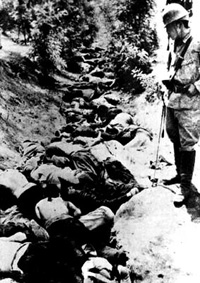Rising actors to play in movie about "Rape of Nanking"

Two rising actors – one of them recently appeared with Meryl Streep – will act in a upcoming drama about mass Japanese killings in World War II-era China.
Lu Chuan's US$10.5 million (EUR7.6 million) "Nanking! Nanking!" is the latest in a series of recent movies about the Japanese military's brutality in the city, an event that became known as the "Rape of Nanking."
Historians generally agree the Japanese army slaughtered at least 150,000 civilians and raped tens of thousands of women in the 1937 rampage in the city now known as Nanjing.
Lu's film, which examines the massacre through the eyes of a Chinese soldier, a Japanese soldier and a foreign missionary, will star actor Liu Ye and actress Gao Yuanyuan, publicist Yan Ran told The Associated Press.
Yan said Liu will play the Chinese soldier and Gao will portray his lover. He said a Japanese actor has been cast as the Japanese soldier but didn't give the actor's name, while the role of the foreign missionary hasn't been cast.
Liu appeared alongside Streep in the drama "Dark Matter," about a Chinese student studying in the U.S. He also played a prince in Zhang Yimou's recent Chinese historical epic "Curse of the Golden Flower."
Gao's credits include the Jackie Chan action comedy "Rob-B-Hood" and Wang Xiaoshuai's "Beijing Bicycle."
In other recent movies about the Nanjing massacre, "Con Air" director Simon West is filming the 400 million Chinese yuan (US$53 million; EUR38.5 million) "Purple Mountain" and Hong Kong director Yim Ho is planning the US$35 million (EUR25.4 million) "Nanking Xmas 1937."
State-backed companies are involved in those two productions, as well as Lu's, which coincide with the 70th anniversary of the massacre.
A fourth movie, an American documentary, was recently released in China. That film, "Nanking" mixes archival footage and stage readings of witness accounts by actors Woody Harrelson and Mariel Hemingway.
The recent movies about the Nanjing killings come amid lingering tensions between China and Japan over wartime atrocities.
Some Chinese still believe the Japanese government hasn't shown enough remorse for its World War II-era actions in China.
Demonstrators vandalized Japanese shops and smashed windows at Japanese diplomatic offices in Shanghai and Beijing in April 2005 to protest the alleged whitewashing of atrocities in Japanese textbooks.
Many Japanese conservatives are disgruntled over what they say are exaggerated stories of Japanese brutality during World War II.
Subscribe to Pravda.Ru Telegram channel, Facebook, RSS!





